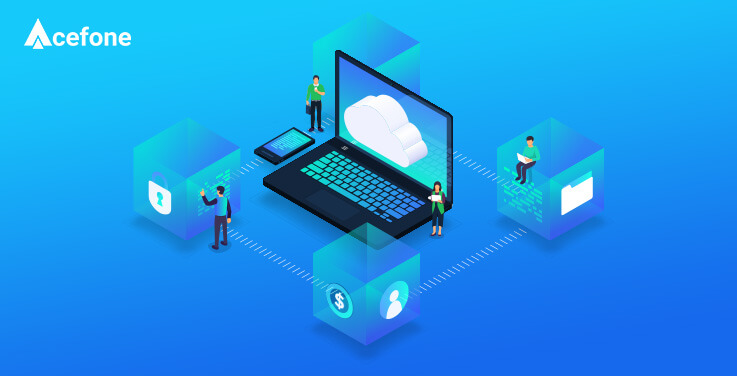Technological innovations have enabled businesses to break through the barriers of cyber threats, data security, and authenticity. One such ground-breaking invention is—blockchain technology.
Though you may think of cryptocurrencies and bitcoins when we talk of blockchain, the technology offers a multitude of benefits. It supports businesses across industry verticals to thrive and overcome numerous challenges.
Reports suggest that global spending on blockchain solutions is predicted to reach $11.7 billion in 2022.
So, what exactly does blockchain technology do? Let’s delve deeper.
What is blockchain technology?
Blockchain is also known as Distributed Ledger Technology (DLT). It secures digital assets and keeps your data unaltered and transparent by using decentralisation and cryptographic hashing.
So, how is this done?
Blockchain technology typically stores data in chains of blocks called digital ledgers. This network of information is interconnected via peer-to-peer nodes.
Each transaction has to be authenticated by the owner of the data; the stakeholder is required to digitally sign and approve every transaction of information. This process of verification protects sensitive data from getting tampered with and misused.
To put it simply, blockchain is similar to a Google sheet. Multiple users can access the information and edit or modify it simultaneously without having to transfer any data.
However, a clear trail of the users who have accessed the data is saved for reference. So, while the information can be accessed, it cannot be corrupted by the users.
Wonder how this technology works?
A blockchain is a combination of three technological approaches:
- Cryptographic keys
- Ledgers connected via a peer-to-peer network
- Computing methodology to save transactions and records
The complete process involves two keys––a public and a private key. These facilitate successful transactions between two parties. Each party is given a set of both keys to generate a secure digital identity reference. This reference, called the digital signature, is linked with the peer-to-peer network.
Data is accessed based on authentication of this signature between two connected parties.
How is blockchain used across various industries?
Without further ado, let us dive in to see how industries use blockchain for greater transparency and confidentiality across various digital platforms.
-
Banking
The first sector that ought to be discussed is banking. Considering the number of risks involved in this industry, blockchain technology can help eliminate these security challenges.
For instance, let’s say you transfer $1000 to your friend. The bank charges a transfer fee of $20. So, you’re effectively able to send only $980 to your friend.
Remittances fees are usually high since they include several players—the source bank, central bank, correspondent bank, and destination bank. Each bank charges some amount for the services they deliver. Such transactions also take a significant amount of time to be completed.
Moreover, remittances necessitate the recipient to have a banking account.
However, these concerns are taken care of by mobile wallets that are powered by blockchain technology. Wallets can be installed in mobiles and cash can be received or sent through them.
A blockchain that works on the Distributed Ledger Technology (DLT) supports immutable transactions. This means they cannot be altered or tampered with once they’ve been recorded. Thus, this is a highly secure medium.
So, how does this work?
Once a payment request is initiated and details are submitted, a digital block is created and distributed across the network. Multiple systems try unscrambling the block and the one that does it first shares it with the network for verification.
Verification includes confirming fund availability on the sender’s side and the legitimacy of the recipient. After the verification is complete, the transaction is authorised and posted to the ledger. The designated parties are updated in real-time.
Since you don’t need to use a third-party payment website or portal, this does not include any hidden fees.
Here, you obtain true autonomy over your transaction with 100% assurance about a fool-proof money transfer.
-
Healthcare
Misuse or unauthorised access to an individual’s medical information can result in serious consequences. This happens when all your information is saved on a centralised repository with little or no data security.
However, the scenario can be taken care of by using blockchain technology.
This technology functions on shared ledgers that are connected over a network and distributed across devices. When compared with conventional databases, blockchain is a clear winner because it:
- Stores sensitive information in a decentralised manner
- Provides rapid access to required information
- Is highly immutable
Here, data cannot be misused or altered without approval from a majority of the stakeholders.
Furthermore, blockchain not only secures critical data but also seeks and registers the consent of patients before sharing their information with others.
When a patient agrees to share their information, this consent is saved in the shared ledger. The platform also records the details of parties who accessed the data along with the time and purpose of the data access.
Therefore, the implementation of blockchain technology results in improved privacy, security, and interoperability of medical data.
-
Cybersecurity
Cybersecurity threats are serious for businesses irrespective of their sizes. These attacks not only result in loss of data but also loss of reputation and clients. They can even lead to a complete shutdown of your business operations.
Fear not, blockchain can relieve you from these nightmares!
This technology secures critical information on a decentralised repository that eliminates the chances of a single-point entry of hackers.
For example, in a typical scenario, hackers may gain access to your network and obtain unauthorised access to confidential information. However, this is ruled out in the case of blockchain technology.
Data is saved in blocks on a peer-to-peer network connection. This is a secure and transparent way of recording and safeguarding information without disclosing critical details. Hence, blockchain proves to be highly beneficial in ecosystems that demand stepped-up security.
-
Cloud communication
Cloud communication comes with the advantage of centralised access to information. Though the technology is dovetailed with high-end security features, storing sensitive information on a common repository of data has always raised eyebrows.
Blockchain technology, on the contrary, promotes decentralised storage of information. Data is secured with appropriate authentication techniques to access every block of data.
This makes it almost impossible for hackers to gain access to sensitive information. Even if a hacker manages to gain access, they may not be able to utilise it to cause harm to an organisation.
Therefore, blockchain coupled with the cloud can indeed raise the bar, in terms of data security.
Talking about Voice Over Internet Protocol (VoIP)––this medium of cloud telephony has been considered the most cost-effective way to streamline business communications.
Blockchain makes it even more cost-effective by scraping off the centralised routing of calls. The call is received by a number. The centralised access point in the current VoIP communication system is then replaced by the distributed network. This is shared by all the users linked to the network.
What’s more? This approach saves routing costs as all calls are established through the distributed ledger. Additionally, high-end security is maintained with improved data transfer speed.
-
Supply Chain Management
Supply chain management involves multiple steps of verification before a product reaches the customer. It involves several individuals and companies to ensure the availability of products across the globe. However, a huge amount of inventory and communication tends to get lost in the process.
Blockchain fills in these gaps in the following ways:
- The block of code tracks every action that takes place in the process. It eliminates the need for manual transitions when moving from one step to another. These blocks of code include several if-then statements. When certain conditions are met, the Blockchain automatically executes the next task, resulting in zero or minimal miscommunication.
- The tracking capability prevents the product from getting wasted. Companies can predict and identify false qualms about the quality or authenticity of a product. This is possible by finding when and where the product was manufactured and the conditions it was stored in.
For example, blockchain technology can be used to check if restaurants are adhering to food safety norms. It can also be used to monitor and track cases in hospitals and their root causes.
What are the benefits of adopting blockchain technology?
The benefits of adopting blockchain technology are endless. It has transformed the way businesses work. So, let’s dive into the most important advantages of this technology:
- It improves security by creating a record that is encrypted and cannot be altered. This helps prevent fraud and unauthorised access to information. Personal data can be anonymised by implementing permission-based access.
- This technology uses a distributed ledger that is shared across a network. Data is recorded and access is granted based on permissions. Transactions are immutably recorded. These capabilities ensure improved transparency, veracity and security.
- Blockchain amps up traceability. You can share data about provenance with customers. It also helps spot specific weaknesses in the process that can be rectified for better efficiency.
Wrapping up
Blockchain technology is here to stay. It can help improve processes from scratch and also boost the existing capabilities of technological approaches. This blog has already shown us how blockchain impacts and supports various industries by stepping up security and tracking critical data.














